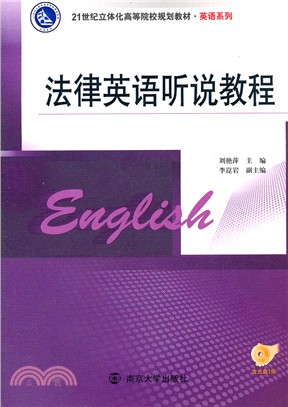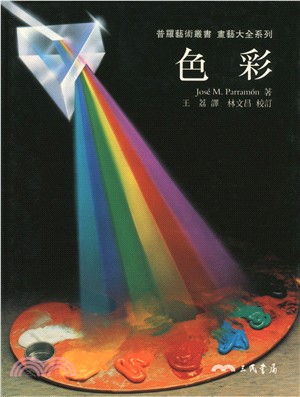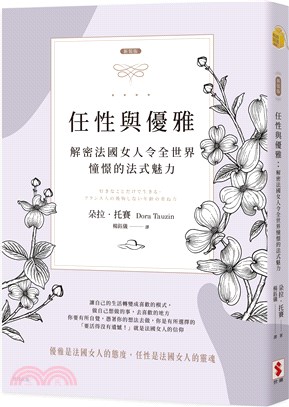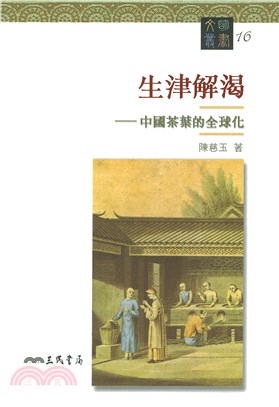法律英語聽說教程(附光碟)(簡體書)
商品資訊
系列名:21世紀立體化高等院校規劃教材 英語系列
ISBN13:9787305085789
出版社:南京大學出版社
作者:劉艷萍
出版日:2011/12/01
裝訂/頁數:平裝/161頁
附件:附光碟
規格:23.5cm*16.8cm (高/寬)
版次:1
商品簡介
名人/編輯推薦
目次
書摘/試閱
相關商品
商品簡介
《法律英語聽說教程》作為法律英語聽說教程,主要通過原汁原味的聽力材料來介紹英美的法律體系,希望學習者通過學刊英美法律的原文材料,掌握純正、地道的法律英語。鑒于法律英語學習者均掌揮了一定的英語語法知識,積累了一定的詞匯量,《法律英語聽說教程》沒有對基本的英語語法和基本詞匯做解釋與注釋。
《法律英語聽說教程》共分16個單元,內容涉及法律英語基本知識,每個單元主要分4個部分:waming.up,Dialogues,Listening Comprehension和Supplementary Material。
《法律英語聽說教程》內容適中,形式新穎,既適用于高等院校英語及法律專業的本科學生、碩士研究生、博t研究生,又可作為法律英語實務部門及其他法律英語愛好者的參考書。
《法律英語聽說教程》共分16個單元,內容涉及法律英語基本知識,每個單元主要分4個部分:waming.up,Dialogues,Listening Comprehension和Supplementary Material。
《法律英語聽說教程》內容適中,形式新穎,既適用于高等院校英語及法律專業的本科學生、碩士研究生、博t研究生,又可作為法律英語實務部門及其他法律英語愛好者的參考書。
名人/編輯推薦
《法律英語聽說教程》是21世紀立體化高等院校規劃教材?英語系列的。
目次
Unit One Legal System / 1
Part Ⅰ Warming-up / 1
Part Ⅱ Dialogues / 2
Part Ⅲ Listening Comprehension / 4
Part Ⅳ Supplementary Material / 5
Unit Two LegalProfession / 11
Part Ⅰ Warming-up / 11
Part Ⅱ Dialogues / 12
Part Ⅲ Listening Comprehension / 14
Part Ⅳ Supplementary Material / 16
Unit Three Legal Education / 22
Part Ⅰ Warming-up / 22
Part Ⅱ Dialogues / 23
Part Ⅲ Listening Comprehension / 25
Part Ⅳ Supplementary Material / 27
Unit Four Judicial System / 32
Part Ⅰ Warming-up / 32
Part Ⅱ Dialogues / 33
Part Ⅲ Listening Comprehension / 35
Part Ⅳ Supplementary Material / 37
Unit Five Constitution / 42
Part Ⅰ Warming-up / 42
Part Ⅱ Dialogues / 43
Part Ⅲ Listening Comprehension / 46
Part Ⅳ Supplementary Material / 48
Unit Six Jury / 52
Part Ⅰ Warming-up / 52
Part Ⅱ Dialogues / 53
Part Ⅲ Listening Comprehension / 55
Part Ⅳ Supplementary Material / 56
Unit Seven Trial Stages / 60
Part Ⅰ Warming-up / 60
Part Ⅱ Dialogues / 61
Part Ⅲ Listening Comprehension / 63
Part Ⅳ Supplementary Material / 65
Unit EightPre-trialProcedure / 69
Part Ⅰ Warming-up / 69
Part Ⅱ Dialogues / 70
Part Ⅲ Listening Comprehension / 72
Part Ⅳ Supplementary Material / 73
Unit Nine Evidence / 78
Part Ⅰ Warming-up / 78
Part Ⅱ Dialogues / 79
Part Ⅲ Listening Comprehension / 81
Part Ⅳ Supplementary Material / 83
Unit Ten Going to Court / 88
Part Ⅰ Warming-up / 88
Part Ⅱ Dialogues / 89
Part Ⅲ Listening Comprehension / 92
Part Ⅳ Supplementary Material / 94
Unit Eleven How to Read Cases / 101
Part Ⅰ Warming-up / 101
Part Ⅱ Dialogues / 102
Part Ⅲ Listening Comprehension / 105
Part Ⅳ Supplementary Material/107
Unit Twelve Criminal Law / 112
Part Ⅰ Warming-up / 112
Part Ⅱ Dialogues / 113
Part Ⅲ Listening Comprehension / 116
Part Ⅳ Supplementary Material / 118
Unit Thirteen Contract Law / 122
Part Ⅰ Warming-up / 122
Part Ⅱ Dialogues / 123
Part Ⅲ Listening Comprehension / 125
Part Ⅳ Supplementary Material/ 127
Unit Fourteen Torts/131
Part Ⅰ Warming-up / 131
Part Ⅱ Dialogues / 132
Part Ⅲ Listening Comprehension / 134
Part Ⅳ Supplementary Material/135
Unit Fifteen The Law ofProperty / 140
Part Ⅰ Warming-up / 140
Part Ⅱ Dialogues / 141
Part Ⅲ Listening Comprehension / 143
Part Ⅳ Supplementary Material / 145
Unit Sixteen Corporation / 148
Part Ⅰ Warming-up / 148
Part Ⅱ Dialogues / 149
Part Ⅲ Listening Comprehension / 151
Part Ⅳ Supplementary Material/153
References / 158
Part Ⅰ Warming-up / 1
Part Ⅱ Dialogues / 2
Part Ⅲ Listening Comprehension / 4
Part Ⅳ Supplementary Material / 5
Unit Two LegalProfession / 11
Part Ⅰ Warming-up / 11
Part Ⅱ Dialogues / 12
Part Ⅲ Listening Comprehension / 14
Part Ⅳ Supplementary Material / 16
Unit Three Legal Education / 22
Part Ⅰ Warming-up / 22
Part Ⅱ Dialogues / 23
Part Ⅲ Listening Comprehension / 25
Part Ⅳ Supplementary Material / 27
Unit Four Judicial System / 32
Part Ⅰ Warming-up / 32
Part Ⅱ Dialogues / 33
Part Ⅲ Listening Comprehension / 35
Part Ⅳ Supplementary Material / 37
Unit Five Constitution / 42
Part Ⅰ Warming-up / 42
Part Ⅱ Dialogues / 43
Part Ⅲ Listening Comprehension / 46
Part Ⅳ Supplementary Material / 48
Unit Six Jury / 52
Part Ⅰ Warming-up / 52
Part Ⅱ Dialogues / 53
Part Ⅲ Listening Comprehension / 55
Part Ⅳ Supplementary Material / 56
Unit Seven Trial Stages / 60
Part Ⅰ Warming-up / 60
Part Ⅱ Dialogues / 61
Part Ⅲ Listening Comprehension / 63
Part Ⅳ Supplementary Material / 65
Unit EightPre-trialProcedure / 69
Part Ⅰ Warming-up / 69
Part Ⅱ Dialogues / 70
Part Ⅲ Listening Comprehension / 72
Part Ⅳ Supplementary Material / 73
Unit Nine Evidence / 78
Part Ⅰ Warming-up / 78
Part Ⅱ Dialogues / 79
Part Ⅲ Listening Comprehension / 81
Part Ⅳ Supplementary Material / 83
Unit Ten Going to Court / 88
Part Ⅰ Warming-up / 88
Part Ⅱ Dialogues / 89
Part Ⅲ Listening Comprehension / 92
Part Ⅳ Supplementary Material / 94
Unit Eleven How to Read Cases / 101
Part Ⅰ Warming-up / 101
Part Ⅱ Dialogues / 102
Part Ⅲ Listening Comprehension / 105
Part Ⅳ Supplementary Material/107
Unit Twelve Criminal Law / 112
Part Ⅰ Warming-up / 112
Part Ⅱ Dialogues / 113
Part Ⅲ Listening Comprehension / 116
Part Ⅳ Supplementary Material / 118
Unit Thirteen Contract Law / 122
Part Ⅰ Warming-up / 122
Part Ⅱ Dialogues / 123
Part Ⅲ Listening Comprehension / 125
Part Ⅳ Supplementary Material/ 127
Unit Fourteen Torts/131
Part Ⅰ Warming-up / 131
Part Ⅱ Dialogues / 132
Part Ⅲ Listening Comprehension / 134
Part Ⅳ Supplementary Material/135
Unit Fifteen The Law ofProperty / 140
Part Ⅰ Warming-up / 140
Part Ⅱ Dialogues / 141
Part Ⅲ Listening Comprehension / 143
Part Ⅳ Supplementary Material / 145
Unit Sixteen Corporation / 148
Part Ⅰ Warming-up / 148
Part Ⅱ Dialogues / 149
Part Ⅲ Listening Comprehension / 151
Part Ⅳ Supplementary Material/153
References / 158
書摘/試閱
To assure independence of the federal judiciary, the notion of their election (even by Congress)was rejected in favor of lifetime appointment by the president with "advice and consent" of the Senate. Where the path to the bench is by way of executive appointment, the power of appointment, at least on the federal level, is generally exercised along political lines. More than 90% of judgeships bestowed by recent presidents have been to members of their own political party, except for Gerald Ford, who appointed only 82% from his own party. The precise way that the appointment process works in the federal system varies depending on whether it is for the lower federal courts or the Supreme Court.
Let's first address the lower federal court appointments. Generally, the president consults with the Attorney General and other advisors, to come up with a list of nominees. In addition, because of the need for Senate approval, certain customs and practices have arisen with regard to appointments to the lower federal courts. Senators with the same party affiliation as the president have a great deal of power to "suggest" nominees to the president for district court posts in their state and have virtually an absolute right to "veto" nominees the president may be considering if they are "personally obnoxious" to the Senator. Arrangements vary from state to state and there are even compromise agreements in some states that allow a Senator of the opposite political party of the president to "suggest" judicial candidates. The president has more latitude in naming judges for the courts of appeal, since circuits cover more than one state, but even there seats are in practice thought of as "belonging" to one or another state, thereby assuring a major role for the Senators from that state.
Let's first address the lower federal court appointments. Generally, the president consults with the Attorney General and other advisors, to come up with a list of nominees. In addition, because of the need for Senate approval, certain customs and practices have arisen with regard to appointments to the lower federal courts. Senators with the same party affiliation as the president have a great deal of power to "suggest" nominees to the president for district court posts in their state and have virtually an absolute right to "veto" nominees the president may be considering if they are "personally obnoxious" to the Senator. Arrangements vary from state to state and there are even compromise agreements in some states that allow a Senator of the opposite political party of the president to "suggest" judicial candidates. The president has more latitude in naming judges for the courts of appeal, since circuits cover more than one state, but even there seats are in practice thought of as "belonging" to one or another state, thereby assuring a major role for the Senators from that state.
主題書展
更多
主題書展
更多書展本週66折
您曾經瀏覽過的商品
購物須知
大陸出版品因裝訂品質及貨運條件與台灣出版品落差甚大,除封面破損、內頁脫落等較嚴重的狀態,其餘商品將正常出貨。
特別提醒:部分書籍附贈之內容(如音頻mp3或影片dvd等)已無實體光碟提供,需以QR CODE 連結至當地網站註冊“並通過驗證程序”,方可下載使用。
無現貨庫存之簡體書,將向海外調貨:
海外有庫存之書籍,等候約45個工作天;
海外無庫存之書籍,平均作業時間約60個工作天,然不保證確定可調到貨,尚請見諒。
為了保護您的權益,「三民網路書店」提供會員七日商品鑑賞期(收到商品為起始日)。
若要辦理退貨,請在商品鑑賞期內寄回,且商品必須是全新狀態與完整包裝(商品、附件、發票、隨貨贈品等)否則恕不接受退貨。
























